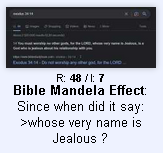And Reuben went in the days of wheat harvest, and found mandrakes in the field, and brought them unto his mother Leah.Then Rachel said to Leah, "Give me, I pray thee, of thy son's mandrakes."And she said unto her, "Is it a small matter that thou hast taken my husband? and wouldest thou take away my son's mandrakes also?"And Rachel said, "Therefore he shall lie with thee to night for thy son's mandrakes."And Jacob came out of the field in the evening, and Leah went out to meet him, and said, "Thou must come in unto me; for surely I have hired thee with my son's mandrakes."And he lay with her that night (vv. 14-16).
At around 9:00 p.m. the same day, I checked /x/ and found this:
So that's unusual. I'm posting this now, about an hour later, so I went back to /x/ to see if the post was still there (yes), and if anyone had said anything interesting (no). To find it, I did a Ctrl-F for mand, and the first hit was this:
Like most "Bible Mandela effect" claims, this is BS. I've been reading the Bible since forever, and it's always said that (minus the word very in the KJV). On a whim, I decided to look up other translations of the verse in question (Ex. 34:14) on BibleGateway. In the list of 50-some translations that came up, only one used boldface and italics, and it therefore jumped out at me.
One of the other versions, a half-translation with many untranslated Hebrew words, had a spelling that was even more of a sync.
El Kanah -- just one letter different from Elkenah, a supposed Egyptian god mentioned in Joseph Smith's Book of Abraham, which I had recently posted about in "Maha-makara whiteboard telepathy." I even referenced Kevin Barney's theory that the name means "El of Canaan." It's quite ironic that the name might actually mean "Jealous God" -- not tolerating rivals -- since Elkenah is depicted as being worshiped alongside four other gods.
It is appropriate that El Kanah, the Jealous God, would be synchronistically associated with the mandrake story in Genesis 30, since that story has to do with jealousy and sexual rivalry.








2 comments:
So El-kanah is also an Australian resort?; https://www.elkanahretreat.com.au/
Not sure if that's a thread worth pulling from but it is rather specific.
A 'game friend' of mine is named Mandrake without knowledge about his handle. Perennial plants that are non-toxic often strike me as targets for the machine. I have wondered about Amaranth genuses and why they had to be eliminated in favor of corn predominantly. Alastair Reynolds named the first victim of his literary universe the 'Amarantheans', almost certainly unaware of the connection to an actual earthbound 'crop'.
@lea
I checked it out. It was apparently founded by a Methodist pastor called Cann, and the name is said to mean "God's possession" and is apparently the same as the biblical name Elkanah (father of the prophet Samuel). The second morpheme is qanah, "get, acquire," and is distinct from qanna, "jealous." I'm not sure why the OJB would use the spelling Kanah, since there is no h in the Hebrew.
Post a Comment